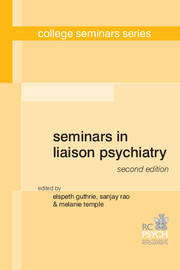Book contents
- Frontmatter
- Contents
- Abbreviations
- List of boxes, tables and figures
- List of contributors
- 1 Basic skills and competencies in liaison psychiatry
- 2 The liaison psychiatry curriculum
- 3 Classification and diagnosis
- 4 Capacity and consent
- 5 Psychological reaction to physical illness
- 6 Medically unexplained symptoms
- 7 Alcohol and substance use in the general hospital
- 8 Accident and emergency psychiatry and self-harm
- 9 Perinatal psychiatry
- 10 General medicine and its specialties
- 11 Liaison psychiatry and surgery
- 12 Neuropsychiatry for liaison psychiatrists
- 13 Psycho-oncology
- 14 Palliative care psychiatry
- 15 Sleep disorders
- 16 Weight- and eating-related issues in liaison psychiatry
- 17 Disaster management
- 18 Liaison psychiatry and older people
- 19 Paediatric liaison psychiatry
- 20 Primary care and management of long-term conditions
- 21 Occupational medicine
- 22 HIV and liaison psychiatry
- 23 Sexual dysfunction
- 24 Psychopharmacology in the medically ill
- 25 Psychological treatments in liaison psychiatry
- 26 Research, audit and rating scales
- 27 Service models
- 28 Developing liaison psychiatry services
- 29 Multiple choice questions and extended matching items
- Appendix 1 Specific competencies
- Appendix 2 Learning objectives with assessment guidance
- Index
24 - Psychopharmacology in the medically ill
Published online by Cambridge University Press: 02 January 2018
- Frontmatter
- Contents
- Abbreviations
- List of boxes, tables and figures
- List of contributors
- 1 Basic skills and competencies in liaison psychiatry
- 2 The liaison psychiatry curriculum
- 3 Classification and diagnosis
- 4 Capacity and consent
- 5 Psychological reaction to physical illness
- 6 Medically unexplained symptoms
- 7 Alcohol and substance use in the general hospital
- 8 Accident and emergency psychiatry and self-harm
- 9 Perinatal psychiatry
- 10 General medicine and its specialties
- 11 Liaison psychiatry and surgery
- 12 Neuropsychiatry for liaison psychiatrists
- 13 Psycho-oncology
- 14 Palliative care psychiatry
- 15 Sleep disorders
- 16 Weight- and eating-related issues in liaison psychiatry
- 17 Disaster management
- 18 Liaison psychiatry and older people
- 19 Paediatric liaison psychiatry
- 20 Primary care and management of long-term conditions
- 21 Occupational medicine
- 22 HIV and liaison psychiatry
- 23 Sexual dysfunction
- 24 Psychopharmacology in the medically ill
- 25 Psychological treatments in liaison psychiatry
- 26 Research, audit and rating scales
- 27 Service models
- 28 Developing liaison psychiatry services
- 29 Multiple choice questions and extended matching items
- Appendix 1 Specific competencies
- Appendix 2 Learning objectives with assessment guidance
- Index
Summary
Psychiatric morbidity in medical patients, although common, is often undetected. In our experience, even when psychiatric morbidity is recognised, treatment is often suboptimal. The general hospital environment and the medical treatments given are increasingly complex. Delivering psychosocial and psychopharmacological treatment will test knowledge and skills as well as encourage flexibility, teamwork and innovation. By way of example, consider the challenges of: delivering a psychosocial intervention/therapy to a man with severe depression who is MRSA-positive and oxygen-dependent in a noisy six-bedded general hospital ward; or administering antidepressant therapy to a man with severe depression and moderate renal failure who lacks a functioning gastrointestinal tract.
It is worth remembering that the efficacy and tolerability of psychotropic medications in psychiatric disorders has been established largely in young adults free from medical illness. There is a dearth of data on psychotropic drug treatment in populations with medical illness and such clinical trials are beset by difficulties. The evidence for benefit and harm is thus for the most part inferred from what is known about non-medically ill population samples. This is a complex area and perhaps the most basic advice we can give to the trainee considering prescribing is to first do no harm (Box 24.1).
Pharmacokinetics of psychotropic drugs
Medical illness and ageing result in a loss of functional reserves due to anatomical and physiological changes. This renders the body less capable of maintaining homeostasis under physiological stress and thus affects the pharmacokinetics and pharmacodynamics of psychotropic drugs. Unsurprisingly, such patients are especially susceptible to adverse effects of psychotropic medication (Pollock et al, 2009). Pharmacokinetic issues most commonly arise in relation to drug absorption and clearance.
Oral drug absorption
Most psychotropic drugs are administered via the oral route as tablets, capsules, liquid or orodispersibles. A number of physiological factors altered by medical illnesses and their treatment may affect the extent and rate of oral drug absorption, including: gastric emptying, gut transit time, ph, gut surface area, and metabolism by bacteria and certain enzymes (e.g. monoamine oxidase) (Parsons, 1977). Neither gastric emptying nor colonic transit times are altered by ageing, and ageing does not appear to have a major effect on intestinal absorption of most drugs.
- Type
- Chapter
- Information
- Seminars in Liaison Psychiatry , pp. 378 - 395Publisher: Royal College of PsychiatristsPrint publication year: 2012



